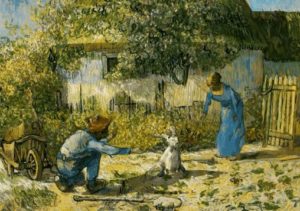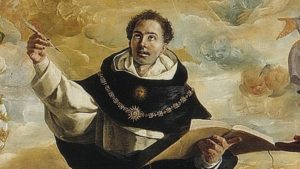Through the Magdalen College of the Liberal Arts curriculum students engage in the close reading and discussion of the classic great books, both within the curriculum’s core and in its four majors. This reading and discussion are oriented fundamentally to the acquisition of wisdom through the careful consideration of questions fundamental to human life, including those pertaining to the nature of the human person and the nature of human flourishing.
The college offers four majors: literature, philosophy, history, and theology.
These majors provide students with the opportunity to enter deeply into a discipline, engaging many of its primary texts, its key tools, and its animating principles. If the core gives students one of the broadest educations available, the majors give students the opportunity to develop a deep familiarity with a particular domain within the world of knowledge and a unique perspective on human experience.
But even here, in selecting a major, we come to know ourselves more deeply. As one of our tutors has observed, very often the student finds that he or she does not so much choose a discipline as be chosen by that discipline.
Each major consists of thirty credit hours, with each major course organized by historical period (e.g., patristic theology) or theme (ethics). Each student also completes a Junior Project during the third year in which he or she studies carefully the works of a single author in the discipline and seniors have the option of either writing a thesis or completing an independent study portfolio project in their discipline.
Students of any major may also elect to earn a Fine Arts Concentration.
Southern Literature
This course is a study of the poetry and fiction of the literary renaissance of the twentieth century. Emphasis is on the communal character of the poetic vision and includes the writings of Davidson, Ransom, Tate, Warren, Porter, Welty, Gordon, Faulkner, O’Connor.
The Russian Novel
In this course students take up the fiction of Gogol, Turgenev, Dostoevsky, and Tolstoy. A special emphasis is accorded the theme of the abrupt and relatively belated confrontation of Christian society with European modernity.
Literary Criticism
This course concentrates on nineteenth and twentieth century critical theory, with its treatment of the nature of poetic form, mimetic theory, genre, and the imagination. It culminates in a comprehensive critical study by the student. Emphasis is on the development of the student’s own critical ability.
The English Poetic Tradition
This course consists in the study of poetry and prose from the Anglo-Saxon period up to Milton, with emphasis  on Shakespeare and the major seventeenth-century lyric poets of the metaphysical and Cavalier schools. Students also consider the genius of English poetry and the origin of the man of letters.
on Shakespeare and the major seventeenth-century lyric poets of the metaphysical and Cavalier schools. Students also consider the genius of English poetry and the origin of the man of letters.
Romanticism
This course consists in a study of the romantic movement in European and English literature, with special concentration on the themes of individual authenticity, revolutionary politics, the philosophical and theological importance of the imagination, the encounter with the demonic, the nostalgia for a lost simplicity of being, and the reverence for nature as the source of moral law. Writers studied include Rousseau, Goethe, Wordsworth, Coleridge, Byron, the Shelleys, Keats, and others.
Modernism
In this course students take up the phenomenon of modernism, particularly in England and America, with its emphasis on formal qualities, irony, point of view. Focus is on connections between modernist poetry and neoclassical and Victorian literature as well as the roots of the modern novel in satire.
The theology major courses build on (1) the six semesters of theology taken by all students at the college (equaling eighteen credit hours) and (2) the theological texts read in the Philosophy and Humanities sequence.
Examples of Theology major courses include:
Creation and Incarnation
The Incarnation is the central event of creation. It defines man and cosmos and ties the threads of physical, mathematical, and moral law into a unified whole. In this course students explore the theology of the Incarnation (1) in relation to the religion of temple Judaism, (2) as the “man-as-microcosm” of the Church Fathers, especially Maximus the Confessor, and (3) as the culmination of the development of created forces as explored by theology, science, and moral philosophy. Through this process, students refine their understanding of the Incarnation using the framework provided by St Thomas in his Summa Theologiae. In this course students also read works by St. Athanasius, St. Maximus the Confessor, Hans Urs von Balthasar, and Joseph Cardinal Ratzinger, among others.
Patristic Exegesis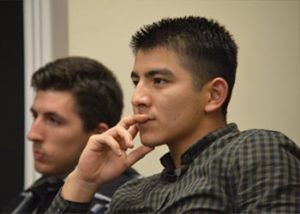
Following the general direction of Henri de Lubac and the Ressourcement movement of the twentieth century, this course explores the Biblical exegesis of the patristic era. Students read in depth the key exegetical texts from influential authors of the patristic period. Students also come to understand and evaluate the methods used by the Church fathers in interpreting Scripture and make use of those methods in their own exegetical work.
Leo XIII and the Social Teaching of the Church
This exploration and close reading of the encyclicals of Leo XIII will enable students to master the sources that have informed the contemporary social doctrine of the Church. Projects will include an original application of the thought of Pope Leo XIII, e.g., the ethical participation in civil government and the practice of truth as a virtue.
Newman and the Twentieth Century Theologians
In this course we begin by carefully identifying the notes of true doctrinal development as identified and described by Blessed John Henry Newman. We then critically examine twentieth-century movements in theology, paying special attention to the argument over the relationship between nature and grace and the relationship of the Church to non-Catholics. In this course students examine works by John Henry Newman, Pius XII, Reginald Garrigou-Lagrange, Marie-Dominique Chenu, Henri De Lubac, Yves Congar, Hans Urs von Balthasar, Joseph Ratzinger, and Pope Saint John Paul II among others.
The Medieval Quest for Wisdom
Through this course students undertake and enquiry into the methods and conclusions of medieval theology, with particular consideration of the question: how does one become wise? The texts for this course will include St. Albert the Great’s Commentary on Dionysius’ Mystical Theology, St. Thomas Aquinas’ Disputed Questions on the Virtues, St. Bonaventure’s Collations on the Seven Gifts of the Holy Spirit, and Peter Lombard’s Sentences.
The History major introduces students to the study of the past as a way of understanding human experience. Students reflect on how we know truths about the past and on the past’s relationship to the present day. They also study topics of fundamental importance to Western culture and the Christian tradition. In addition to the course on the nature of historical thinking, courses in the major are offered on Ancient History, European History, and American History. Examples of History courses follow:
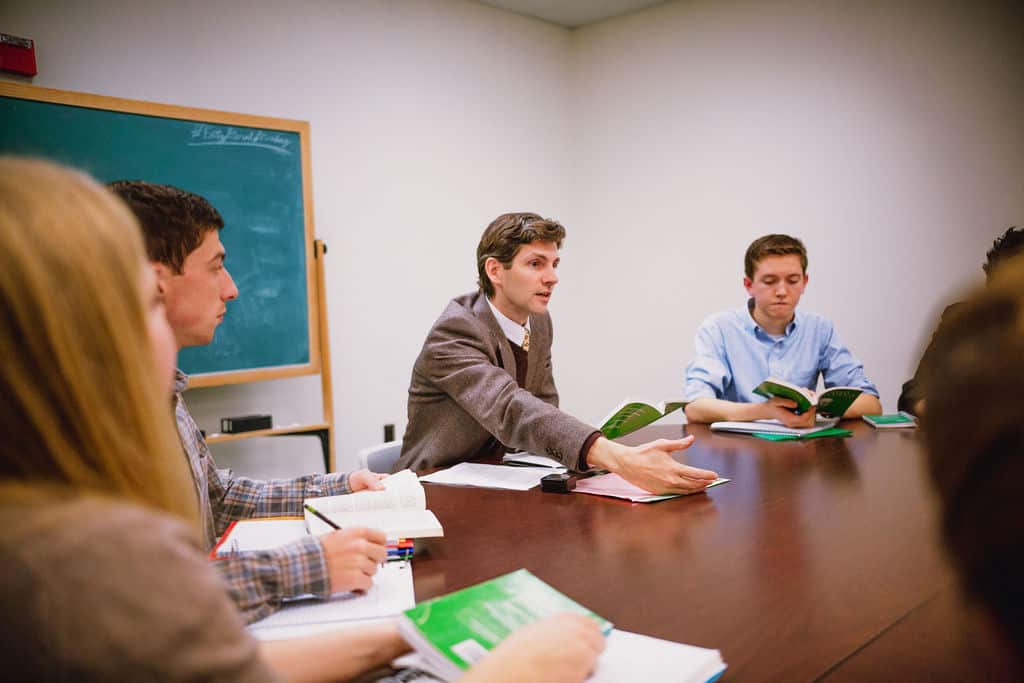 Remembering the Past: The Study of History
Remembering the Past: The Study of History
This is a course about history itself – what can we know and say about the past? what bearing does it have on the present? To answer these questions, we will examine different ways of thinking about, understanding, and writing history. This will involve a consideration of earlier historians – Herodotus, Thucydides, and Eusebius, for instance – and of more recent authors such as Christopher Dawson and John Lukacs. We will also give special consideration to exploring whether there is a distinctively Catholic understanding of history.
Tradition and Reform in Christian Culture
This course considers how Christians have reflected on history and on the role that past events, traditions, and people play in their lives. Christianity has its origins in the historical event of the Incarnation, and its early development was shaped by Scriptural authority as well as by the Greco-Roman culture which surrounded it. Christians have sought a connection with their past by preserving traditions, both written and unwritten, but they have also continually felt the call of reform, which often disrupts established norms.
The course will examine this interplay of tradition and reform in Christian culture from the end of the Roman Empire through the Protestant Reformation. We will study a range of historical documents, objects, and writings, including art, poetry, and works of theology. At the same time, we will consider how these older ways of conceptualizing the past compare with those which we have in our own day, in which notions of “modernity” and “progress” loom large. The course will therefore raise questions about the meaning of history, as well as how the past should figure in one’s thinking about the present and the future.
Religion, Culture, and the Formation of America
This course will examine the varieties of religious cultures in North America from the earliest contact between Europeans and natives through the establishment of the United States. We will consider topics such as Catholic missions, Christianity’s role in America’s founding, and debates on the relationship of church and state.
Cultures of Revolution in the Early 20th Century
This course examines the way that political revolutions have shaped the modern world, by considering four significant early 20th-century revolutions and independence movements, in Russia, Ireland, India, and Turkey. We will attend to the connections between politics and culture by considering also the roles played by, among other things, religion, language, and art. In the process, we will discuss how these revolutions contribute to our understanding of modernity itself by examining topics such as nationhood and empire, pacifism and political violence, secularism, and historical progress.
As a Philosophy major, a student will build on the eight semesters of philosophy they have already studied within the Philosophy and Humanities Seminars. Whereas those courses proceeded more chronologically and across disciplines, the courses for the major focus on particular areas within philosophy, e.g., metaphysics, ethics, and epistemology as well as more concentrated historical periods. Examples of these courses include:
Word and Truth (Epistemology)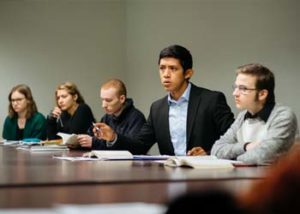
How is the intellect related to that which it knows? Can the mind grasp reality adequately – that is, as a whole? Is reason in any way bounded, and, if so, what are the nature of these limits? Can the human person naturally know God? Is knowing essential to man’s life – if so, in what respect? In this course we will approach the basic standpoint of ancient philosophy concerning the scope and purpose of human intelligence, dwell with the magisterial account of reason’s relation to being and of the transcendental character of truth offered by St. Thomas Aquinas, explore the ways in which the bond between thinking and being was brought into question in modernity, and engage late modern efforts to overcome this dualistic juxtaposition (especially in the writings of Edmund Husserl, Edith Stein/St. Teresa Benedicta of the Cross, Martin Heidegger, and Hans Urs von Balthasar).
The transcendental of truth comes to expression in a variety of basic experiences. In this seminar, we will especially consider how embodiment and the senses bear on our knowing, how feeling offers us an interior perspective on that which we know (empathy), and how dialogue (including in the form of education) is the proper locus for a fully human understanding of the world.
Person and Community (Anthropology)
Who am I who am? Our thinking never leaves behind but abidingly lives from the wonder that we exist at all. I first encounter myself as “me” through being known and addressed by another person, an I who is a Thou to me. Indeed, I grow into my own personhood through engaging with and belonging to the social whole. How has the tradition conceived of community and the person’s place within it? How did Christian thought take up and transform ancient philosophical anthropology, and what tensions did this thought introduce into an understanding of community and natural human fellowship? How has modernity received the authentic Christian vision of the unity between self-love and neighbor-love?
Here we will reflect on truth as seeing through and with another’s gaze, on how reality is meant to be known and enjoyed in common, on friendship as the locus of self-becoming, and on family as the most basic and most paradigmatic expression of community.
Major authors include Aristotle, St. Augustine, Hegel, Kierkegaard, and Wojtyla.
God and Being (Metaphysics)
This course is an exercise in that most characteristically philosophical act: the contemplation of what it means to exist at all. According to the great witnesses of the tradition, this act begins in wonder and, if followed through faithfully, ends in rejoicing. Together with classical and medieval authors, we will ask basic questions about the things we experience: what does it mean to be one complete thing? To have a nature and to change? To be related to other finite substances and to God? To be caused and to cause others in turn? In view of such questions, we’ll also consider how metaphysics sheds light on the phenomenon of bodily life and on the integrity of the organism.
Thinking philosophically about reality in light of a Christian confession of God as Creator will lead us to ponder the structure of interpersonal gift-giving as an expression of how the finite world comes into being in the first place. We’ll find that in our present age the meaning of gift is both most directly challenged and most lucidly articulated. We will accordingly turn our attention to rejections, revisions, and recoveries of metaphysics among modern authors, and will explore how a Thomistic account of being can respond to and account for legitimate concerns voiced in our day.
The course will end by placing the many principles discussed over the semester at the service of understanding the constitution of the human person, man and woman, in whom the full meaning of being as gift is unfolded.
Freedom and the Good (Ethics)
The meaning of freedom is bound up with our root desires. For what purpose do we act whenever we act, and how are our judgments and dramatic decisions in the concrete events of life related to that purpose? Why do I love to be, and why do I will to be good? What would it mean to do something for its own sake? Such issues lead us to ponder our finitude before God. Can I be said to act spontaneously from myself and to be responsible for myself if I have my origin and end elsewhere than in myself? Is divine freedom a foreign violence and upward limit against my freedom, or else its most intimate source and assurance? Are you free when you receive from, depend on, and commit to another? This course will take up dominant accounts of freedom in the philosophical tradition from the Greeks to the Germans, and will examine such basic features of human action as desire, choice, consent, commitment, authority, and creativity. The heart of the course is a meditation on what freedom looks like when most perfectly exercised, and hence on the happiness in which willing comes to fruition.
Spirit and Institution (Political Philosophy)
What does it say about human nature that man should seek to govern and to be governed? Is rule and participation in a political order — city, kingdom, state — a good thing at all, or a necessary evil, or simply repugnant to happiness? What is an institution in the best sense — is such a thing worth having, and can an institution positively liberate culture?
This course pursues such questions in view of the tension between high medieval and modern political thought. We will examine the anthropology that liberalism represents, compare it to the classical tradition (as encapsulated in the thought of Thomas Aquinas), and consider several assessments of the modern state’s gains and costs in such figures as Hegel, Arendt, and Voegelin. Doing so will enable us at once to consider perennial truths about man and our own situation. The heart of the course will be reflection on whether good rule serves the formation (education) of the members of a body politic into their own freedom, and under what conditions it can do so.
In addition to their major, students may also choose to concentrate in the fine arts. The Fine Arts Concentration offers students the opportunity to adopt a humanistic, philosophical, and theological focus on those arts that seek to create beauty and the experience of those arts. Drawing upon and extending the curricular and co-curricular offerings in music and the visual arts, including the college’s Arts of the Beautiful Program, this concentration is ideal for those students who have studied music or art prior to enrolling at the college and those who intend to cultivate the arts non-professionally in postgraduate life.
The Fine Arts Concentration requires the following:
Students will have the opportunity to take one of the following courses for college credit. Taught in Socratic-style seminar discussions, each course enables students to explore a particular interest and consider whether they might like to pursue that academic discipline as a potential college major. Students will spend 3.5-4 hours in class each day, have some assigned homework, and spend the remaining time in prayer, liturgy, sacred music, relaxation with new friends, and a wide range of extra-curricular activities.
Theology of the Body: The Deeper Meaning of Love, Sex, and Marriage (1 credit) – Dr. Ryan Messmore
THIS COURSE IS NOW FULL
When it comes to romantic relationships and marriage, today’s culture is awash in confusion. The Church calls people to see a deeper meaning to sexual desire and marriage. But what is that, and how can it be pursued in modern times? Saint Pope John Paul II has provided valuable teaching in this area. Along with his “Theology of the Body,” this course will explore the nature of love, the meaning of betrothal and marriage, and sexual ethics from a Christian perspective. Class discussions will be theological and philosophical as well as practical.
Philosophy & Humanities: Friendship in Western Culture (1 credit) – Dr. Brian FitzGerald and Dr. Erik Van Versendaal
THIS COURSE IS NOW FULL
One of the most important features of human experience is friendship. Drawing on the great books of Western culture in literature, history, philosophy, and theology, from Aristotle and St. Augustine to Jane Austen and C.S. Lewis, this course will reflect on the nature of friendship across the centuries. Why do we need friends? What makes a good one? What are some obstacles to friendship? What happens as friends grow and mature in different ways?
Christ in Scripture (1 credit) – Deacon Karl Cooper
THIS COURSE IS NOW FULL
“Did not our hearts burn within us while he talked with us on the road, while he opened to us the Scriptures?” In this course we will seek to meet and understand Christ as he presents himself in all the Scriptures. We will read, discuss, enjoy, and pray through the most crucial texts, and focus our work on the living and present Christ.
$395.00 USD
Tuition includes room and board. The purchase of a book may be required for some classes. Students should bring spending money for off-campus trips.
Students will have the opportunity to take one of the following courses for college credit. Taught in Socratic-style seminar discussions, each course enables students to explore a particular interest and consider whether they might like to pursue that academic discipline as a potential college major. Students will spend 3.5-4 hours in class each day, have some assigned homework, and spend the remaining time in prayer, liturgy, sacred music, relaxation with new friends, and a wide range of extra-curricular activities.
Physics: Understanding Boomerangs, Billiard Balls, and Balance Beam Routines (1 credit) – Mr. John Klucinec
THIS COURSE IS NOW FULL
This course explores the laws of motion as described by Galileo and Newton by reading and discussing these authors and through classroom experiments. Students will gain an understanding of physics in concrete phenomena through studying air flight, fluid dynamics, the aerodynamics of the boomerang, the motion of billiard balls, and the physics of gymnastics and diving.
Poetry and Politics in the Western Tradition (1 credit) – Dr. Mary Mumbach
THIS COURSE IS NOW FULL
This course will examine poetic form and political form in the tradition of the West. Students will explore, in particular, how the Incarnation shapes the roles of imagination, prudence, and the heroic in literature and political philosophy. Readings in poetry, fiction, and American Founding documents will be considered.
Moral Philosophy: How Do We Make the Right Decisions? (1 credit) – Rev. Fr. Stephen Rocker
THIS COURSE IS NOW FULL
Natural law morality and utilitarianism are incompatible frameworks of moral reasoning, yet elements of both are mixed in the public mind. Catholic moral teaching and the Western system of law are grounded in natural law. This course will present these two moral frameworks and apply them to moral issues.
$395.00 USD
Tuition includes room and board. The purchase of a book may be required for some classes. Students should bring spending money for off-campus trips.

